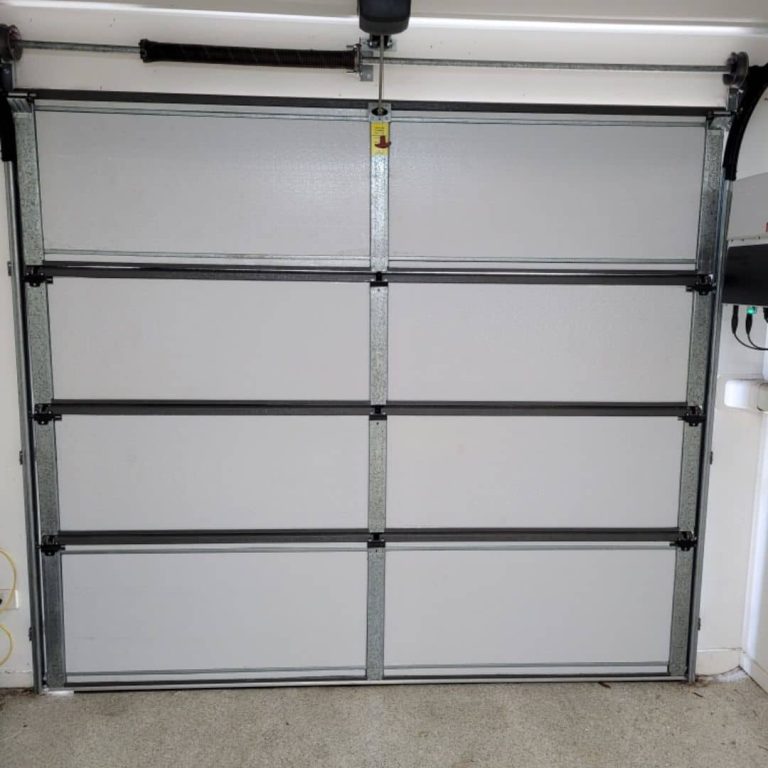Garage doors of all types provide a great defense from the Australian elements. But the amount of protection you’ll get against heat, cold, and noise can vary with the type and quality of insulation. That’s why you’ll want to do your research and choose the best garage door insulation available.So which type is tops? Well, that depends on your needs and the type of door you have. Across Australia, where the temps can fluctuate in extremes, temperature control is usually a concern for homeowners looking to insulate a garage door. This can let you double up the use in your space, from storage to a workshop or an expanded living space for the family.Ease of install and fit is also usually important for homeowners attempting to go it alone with a DIY install. In this case, panels tend to be MUCH easier to manage than a loose or blow in fill material. (Just ask the people who are still picking fluff out of their clothes.)So, let’s dive in and figure out the best type of insulation for your garage door.
How different can garage door insulation be?
Quite different, actually.To oversimplify it, the quality comes down to the material used. We’ll break this out in more detail down below. But first, a recap of the three main types of material used to insulate garage doors:
1. Fibreglass Batting
Made of glass wool in pre-cut panels or long sheets, fiberglass is a traditional material long used in homes across Australia. Some batting comes with paper or vinyl facing that gives a smooth surface to press against the doors and makes it a bit easier to work with.You should be able to cut these sheets or panels down to the size you need for your sectional garage door. They can also require retaining pins to keep the batting in place during door operation.
2. Cellulose Fibre
Looking for a solution that’s also eco-friendly? Cellulose is made of recycled papers like cardboard that are repurposed into insulation. It’s also treated with borax and other chemicals to make it fire-retardant.It’s important to keep in mind that this type is also a loose fill. To use it on a garage door, you’ll need to insert it in a casing or other material. Otherwise, it will just blow around. What’s more, you can lose thermal performance if the fill is not evenly distributed with zero gaps.
3. Rigid Foam Panels
Made of polyisocyanurate insulation (PIR), this premium material comes in boards and can be cut or ordered to size. These boards are also double-sided for protection, keeping out the heat in summer while keeping the cool inside.They’re also considered a type of continuous insulation. This means that they don’t have seams or fasteners that can allow heat or cold through.
Finding the best garage door insulation for you
Fibreglass, cellulose fibre, and rigid foam each offer their own pros and cons when it comes to insulating your garage doors. So how do you pick the right one for you?It comes down to the features, functions, and fees that match your exact needs. Take a tour of our chart below to see which types perform best under different circumstances.
| Feature | Fibreglass | Cellulose | Rigid Foam |
|---|---|---|---|
| Pre-Cut Panels | ✔ | ✘ | ✔ |
| Loose Fill | ✘ | ✔ | ✘ |
| Fits Small Spaces Well | ✔ | ✘ | ✘ |
| Easy to Cut | ✔ | ✘ | ✔ |
| Eco-Friendly | ✘ | ✔ | ✔ |
| Australian R-value Over 1 | ✘ | ✘ | ✔ |
| Fire Resistant | ✘ | ✔ | ✔ |
| Blocks Heat Well | ✔ | ✘ | ✔ |
| Blocks Cold Well | ✔ | ✘ | ✔ |
| Blocks Noise Well | ✔ | ✘ | ✔ |
| Continuous | ✔ | ✘ | ✔ |
Defining the best when it comes to insulating a garage door
Want another way to explore the best garage door insulation options for you? Compare any product you’re considering against this handy checklist:
- Material R-value of 1.75 or more
- Manufactured from PIR for fire resistance
- No glues or chemicals needed for install
- Average install time under 3 hours
- No tools needed other than for cutting panels
- Product warranty protecting against defects
- Lightweight materials to reduce door strain
- Laminated panels for a clean, professional look
Is it worth hiring someone to help install garage door insulation?
It certainly can be.Consider that a professional installer should be well versed in getting the job done right, quickly, and effectively. Just make sure that the installer you pick is familiar with the actual panels or insulation you choose. This will help save on time (which, in turn, is money). Hiring an installer who also provides panels can sometimes even save you on overall costs.Of course, there are also DIY installation kits specifically designed for garage doors. This makes it much easier to do the project yourself. While you might have to trim materials to the exact size, you’ll have everything you need on hand. The best garage door installation kits also include options for weather seals and BAL ratings.
Bonus Tips: Getting garage door insulation done right
Panel sizes can vary! If you are cutting your own insulation panels, take the time to measure each section of your garage door before cutting into the material. Don’t just measure one audcasinos panel and use it as a template for the rest. You’ll certainly save time and money this way.
Insulation can actually help protect your car. Seriously! While garaging your vehicle in itself will keep it out of the elements, insulation can help regulate the temperatures. This can help protect the engine from extremes and extend the life of your car. Consider a garage door seal for added protection.Custom for custom makes sense. If you have a custom garage door or unique set up, it might be best to chat with an insulation installer before you place an order. You could benefit from custom sizing, installation, or opting for oversized panels that will give you more coverage for the cost.
So what’s the best insulation for your garage doors?
While circumstances and requirements will vary, rigid foam boards made of high-quality polyisocyanurate insulation (PIR) tend to take the lead in almost any contest.That’s why KoolDoor offers the best garage door insulation across Australia with PIR that’s fire-resistant and lightweight with a high R rating.Our panels are premade and ready to install in just hours. They’re designed for DIY set up, but our team of experts is always on hand in case you want (or need) extra help. And every KoolDoor product meets the requirements for structural loads, so you don’t have to worry about your door’s performance while making sure your garage is thermally protected.Explore our product store online today or call us on 1300 373 839 with any questions.



